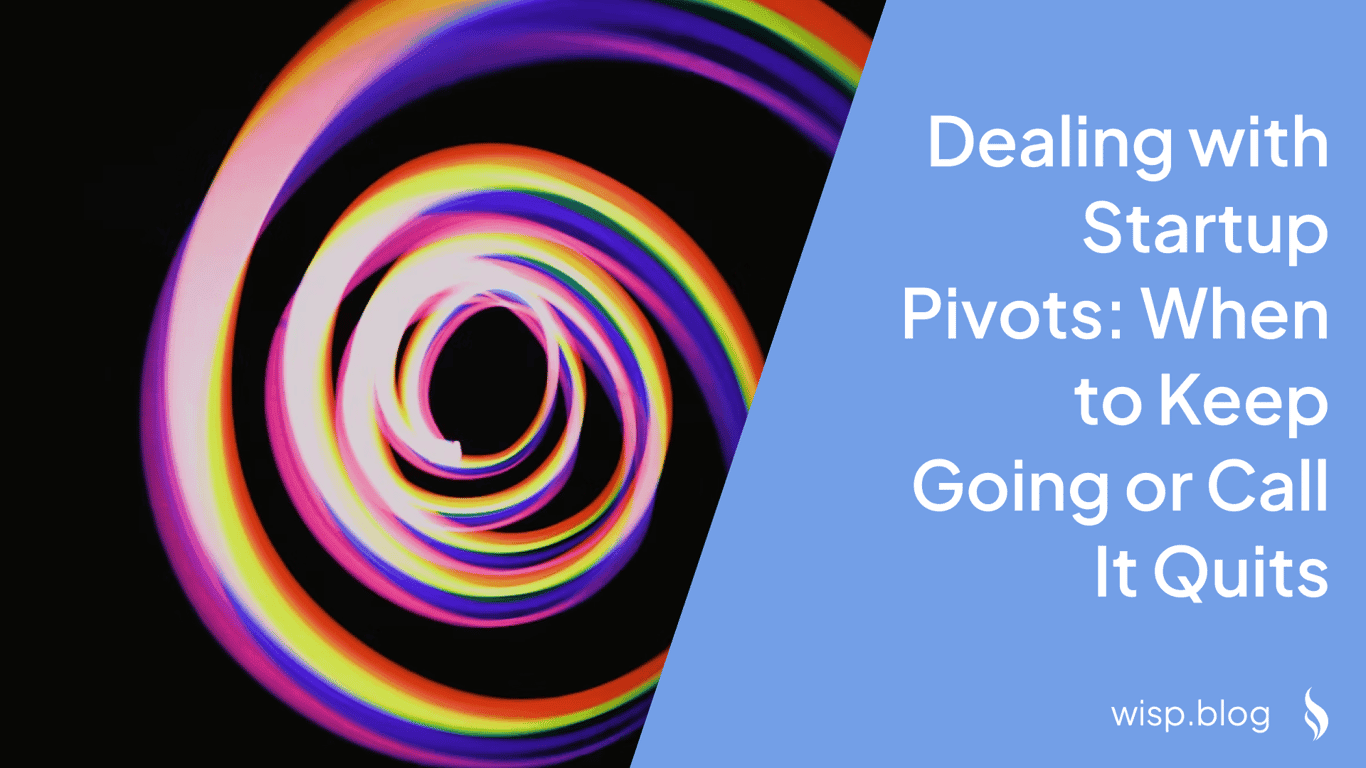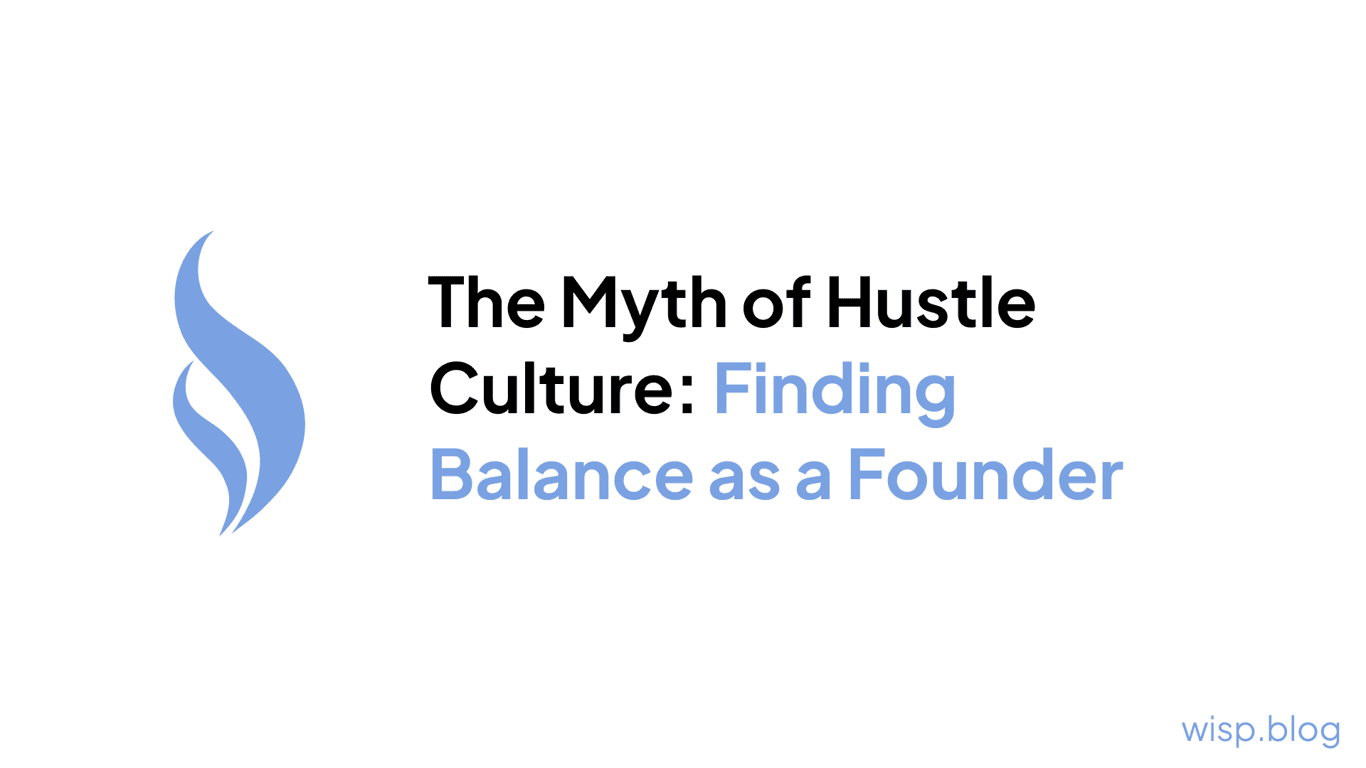 You've poured your heart, soul, and savings into your startup. Your friends call you "passionate" on good days and "obsessive" on bad ones. But lately, that fire that once burned so bright feels more like a flicker. You find yourself staring at the ceiling at 3 AM, wondering if you're building something revolutionary or just burning through resources on a pipe dream.
You've poured your heart, soul, and savings into your startup. Your friends call you "passionate" on good days and "obsessive" on bad ones. But lately, that fire that once burned so bright feels more like a flicker. You find yourself staring at the ceiling at 3 AM, wondering if you're building something revolutionary or just burning through resources on a pipe dream.
If you're asking yourself whether it's time to quit, deep down, you probably already know the answer.
The entrepreneurial journey is romanticized in business magazines and TED Talks, but the reality is much harsher. According to recent studies, a staggering 72% of founders struggle with mental health issues, 37% suffer from anxiety, and 36% experience burnout. These aren't just statistics—they're warning signs of the emotional battlefield that is entrepreneurship.
The Hidden Emotional Challenges of Startup Life
The Weight of Uncertainty
Every morning as an entrepreneur begins with a gnawing question: "Will today be the day it all falls apart?" This constant state of uncertainty creates a stress response that never fully deactivates. Your mind becomes a 24/7 strategy room, running scenarios even when you're supposedly relaxing.
"You literally hear about problems and things that don't work 90% of the day, every single day, including evenings, nights and days off (if any)," shares one founder on Reddit. This relentless exposure to problems creates a distorted reality where negativity seems to dominate, regardless of actual progress.
The weight of this uncertainty doesn't just affect your business decisions—it infiltrates every aspect of your life. Sleep becomes elusive. Relationships strain. Your health deteriorates while you're too busy "grinding" to notice.
The Loneliness at the Top
"An entrepreneur is never 'off'. The brain needs time to disconnect, and an entrepreneur can't do that," explains another founder. This inability to disconnect creates a peculiar form of isolation—you can be surrounded by people yet feel completely alone in your struggles.
The irony is painful: you might have a team counting on you, investors checking in, and family asking how business is going, yet you can't fully express your doubts or fears to any of them. After all, who wants to follow a leader who admits they're lost?
This isolation intensifies when faced with difficult decisions. When product-market fit remains elusive after multiple pivots, or when traction plateaus despite your best efforts, there's no rulebook to consult and often no peer who truly understands your specific situation.
The Sunk Cost Fallacy Trap
Perhaps one of the most dangerous emotional pitfalls is what psychologists call the sunk cost fallacy. After investing months or years of your life into a venture, the thought of walking away feels like failure—even when all signs point to it being the rational choice.
"Most founders quit too late because they confuse being persistent with being in denial," notes a YCombinator forum member. This confusion costs entrepreneurs not just money, but precious time—often their most valuable and limited resource.
The opportunity cost becomes increasingly painful as you watch peers move forward in their careers while you remain stuck in a cycle of "just one more pivot" or "just six more months of runway." The emotional attachment to your business idea can cloud judgment, preventing you from seeing that what began as persistence has morphed into denial.
Recognizing the Burnout Before It Consumes You
Burnout doesn't arrive suddenly with a dramatic crash. Instead, it creeps in gradually, normalizing itself until you can no longer remember what it felt like to be passionate and energized about your work.
The Warning Signs
The first signs often manifest physically. That "temporary" insomnia becomes chronic. The occasional stress headache becomes a daily companion. Your exercise routine—once a non-negotiable part of your schedule—gets repeatedly pushed aside for "just one more email."
Cognitive symptoms follow. Decision fatigue sets in, making even simple choices feel overwhelming. Your creativity, once your competitive advantage, now feels forced and inadequate. The compulsive urge to keep working even when exhausted becomes your default mode of operation.
Finally, emotional indicators emerge. You find yourself snapping at team members over minor issues. Customer complaints that once motivated improvements now trigger defensiveness. The vision that once inspired you now feels like a burden.
According to the EOS Worldwide blog on business owner burnout, many entrepreneurs develop a negative outlook where they "can't see anything positive in their efforts and feel overwhelmed by all the unresolved issues." This cynicism is particularly dangerous because it undermines the very optimism that fuels entrepreneurial endeavors.
The Self-Assessment Test
Ask yourself these questions honestly:
Do you still find joy in the core work of your business?
Have you made meaningful progress toward your goals in the past six months?
Is your physical and mental health in good condition?
Do your close relationships remain healthy and supportive?
Would you choose this path again knowing what you know now?
If you answered "no" to more than two of these questions, it's time to seriously evaluate whether you're on a sustainable path.
When to Consider Moving On
The Hard Truth About Product-Market Fit
The elusive product-market fit remains the holy grail of startup success. Yet many entrepreneurs cling to their original vision despite mounting evidence that the market simply doesn't value their solution enough to pay for it.
"If no one is buying your product, it's usually one of two things: There's no product-market fit—you're solving a problem no one cares enough about. Or you're bad at sales—you might have something valuable, but you can't convince people to try or pay for it," explains a founder on Reddit.
After multiple pivots with minimal customer adoption, it's essential to honestly assess whether you're pursuing a viable opportunity or chasing a mirage. Revenue estimates that consistently fail to materialize aren't just financial disappointments—they're market feedback you ignore at your peril.
When the Growth Stalls
Sustainable growth is the lifeblood of a startup. When that growth flatlines despite your best efforts, pay attention. As one entrepreneur candidly shared, "Multiple pivots, no growth in customers or users, pilots that don't renew, inability to raise funds, layoffs without clear reasoning—these are all warning signs."
The negative signals may not all appear simultaneously, but their accumulation should trigger serious reflection. Can you honestly envision a path to sustainable growth? Or are you simply postponing the inevitable?
The Passion Gauge
Perhaps the most telling indicator comes from within. "Do you love it? Do you wake up wanting to spend your days on it? If not… does anyone else? If you don't want to and nobody else does… it's a failure," advises a successful entrepreneur.
When your passion evaporates, everything becomes exponentially harder. Tasks that once energized you become drains on your limited willpower. Creative solutions become scarce just when you need them most. This emotional disconnect often precedes business failure and personal crisis.
Strategies for Moving Forward
Embracing the Pivot (or the Exit)
Sometimes moving on doesn't mean abandoning ship entirely. A strategic pivot—targeting a different customer segment or revamping your business model—can breathe new life into your venture. This isn't admitting defeat; it's demonstrating the adaptability that defines successful entrepreneurs.
For others, a clean break represents the healthiest path forward. "It's really hard to give up sometimes, particularly if it's a passion of yours," acknowledges a founder. "But you know it's time to quit when you're not making progress and the passion is gone. If you're not learning, not growing, and it's draining you, it's a sign."
Remember: ending one venture opens the door to new opportunities. Your accumulated experience and lessons learned become invaluable assets for whatever comes next.
Prioritizing Self-Care During Transition
"If you can't run yourself, you can't run the ship," warns an experienced entrepreneur. This wisdom becomes particularly relevant during transitions.
As you navigate the emotional process of stepping back, deliberately schedule time for activities that restore your mental and physical health. Exercise, meditation, reconnecting with neglected relationships—these aren't luxuries but necessities for rebuilding your resilience.
Consider working with a therapist or coach who specializes in entrepreneurial challenges. They can provide valuable perspective and tools to process the complex emotions that accompany major business transitions.
The Strength in Stepping Back
The entrepreneurial community often celebrates persistence above all else. However, true wisdom lies in recognizing when persistence becomes detrimental to your well-being and future potential.
"If you don't set up mechanisms where you realize that there's good in your life and business, you'll eventually get destroyed by the sheer perceived negativity from your business, even if that is definitely not the case," cautions a founder who learned this lesson the hard way.
Stepping back isn't failure—it's a strategic realignment of your most precious resources: your time, energy, and talent. It demonstrates the self-awareness and courage that define truly successful entrepreneurs.
The next time you find yourself staring at the ceiling at 3 AM, remember that sometimes the most entrepreneurial decision you can make is to recognize when it's time to move on—and to do so with the same boldness and vision that led you to begin your journey in the first place.


